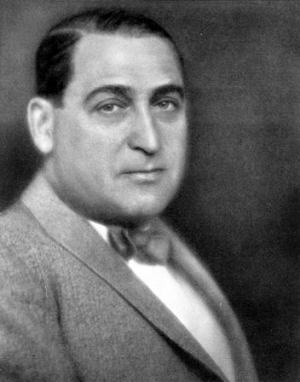Gallery
All Pictures (3)Biography
The son of a wealthy industrialist family attended Leipzig's commercial college and studied at Landwirtschaftliche Hochschule Berlin. After his graduation, he lived the life of a playboy and spent his parents" fortune in several different jobs. In 1902, he married the operetta singer Hermine Pfleger and in the same year, their daughter Eva Maria was born who herself tried to start a career in the film business in 1917. From then on, Pfleger called herself Mia May and her husband took over her stage name as Joe May. In 1911, he made an introduction film for the revue "Rund um die Alster" in Hamburg, where Mia performed.
In 1912, May made his debut as a director and author with the love tragedy "In der Tiefe des Schachtes" for Continental-Filmkunst in Berlin. The film was also Mia May's movie debut. His next film, "Die geheimnisvolle Villa", was the first film of the series around the detective Stuart Webbs (played by Ernst Reicher). In 1915, May set up the production company May-Film in Berlin and finished "Das Gesetz der Mine", the start of the Joe Deebs detective series that mixed crime film elements with comedic elements. Besides, he produced a series that starred Mia May in melodramas and society pieces. Producer May partly used other directors for these films and promoted young, talented authors and directors like Thea von Harbou, Fritz Lang, and Ewald André Dupont. In 1918, the new production company Universum-Film AG (Ufa) took over May-Film GmbH but handed back their shares of May-Film to May one year later. However, Ufa still had a strong influence on May-Film that operated a film studio in Berlin-Weißensee and an outdoor area in Woltersdorf.
After the war, May started to shoot the pompous film "Veritas vincit". The success of this 3,5 hour long major production encouraged May to shoot the eight-part film "Die Herrin der Welt" ("Mistress of the World") that tried to persuade viewers with exotic locations, the appeal of artful decorations and alternating genres – from the melodrama to detective and travel movies and finally to parodic comedy. Again with Mia May in the leading role, he produced melodramas that were directed by Fritz Lang, Robert Dinesen, and Holger Madsen, among others. When American filmmakers set up Europäische Film Allianz GmbH (E.F.A.) as a reaction to Ufa in Berlin, May became one of their most important artists besides Ernst Lubitsch. For E.F.A., May finished the two-part film "Das indische Grabmal" ("The Indian Tomb") in 1921, based on a screenplay by Harbou and Lang. May's four-part society crime film "Tragödie der Liebe" ("The Tragedy of Love") also became an artistic success in 1922/23.
Because of the inflation, May restructured his company into the May-Film AG in 1923. After her daughter Eva's suicide, Mia May did not make another movie. "Der Farmer aus Texas" (1924/25), based on Georg Kaiser's play "Kolportage", was aimed at international markets but became a financial fiasco. May then directed several smaller films for other producers. Within Ufa's Erich Pommer-Produktion, May finished his last two silent films in 1928/29: "Heimkehr" ("Homecoming"), based on the Leonhard Frank's World War novella "Karl und Anna", and "Asphalt", a milestone of the Weimer cinema.
As Fred Majo, May together with Hans Székely wrote the screenplay to the first sound film by Pommer-Ufa-Produktion, "Ungarische Rhapsodie" ("Hungarian Rhapsody", 1928), directed by Hanns Schwarz, and produced Gustav Ucicky's sound film operetta "Der unsterbliche Lump" ("The Immortal Vagabond") and Kurt Bernhardt's "Die letzte Kompagnie" (Thirteen Men and a Girl), a film ballad about Prussia.
His first sound film as a director, "Ihre Majestät die Liebe" ("Her Majesty Love"), is considered to be one of the few milestones of German film comedies. The international entertainment movies "...und das ist die Hauptsache" ("That's All That Matters") und "Paris – Méditerranée" ("Companion Wanted") turned out to be the last productions by May-Film AG before it was liquidated in 1932.
After the premiere of Jan Kiepura's film "Ein Lied für Dich" ("A Song For You") in April 1933, May emigrated to Hollywood via London where he was commissioned by Pommer to direct the musical "Music in the Air". The film – the first Hollywood film with fundamental participation of emigrants from Nazi Germany – flopped at the box office, just like his court melodrama "Confession" (1937) for Warner Bros.
Since 1939, May focused on directing B movies for Universal. In 1943, he directed the anti-Nazi film "The Strange Death of Adolf Hitler" about a fictional murder conspiracy against the "Führer". The war comedy "Johnny Doesn’t Live Here Anymore" was Joe May's last film as a director.
In 1949, Joe and Mia May who had already run the restaurant "Piowati" in Berlin opened the restaurant "The Blue Danube" in Los Angeles but had to close already a few weeks later. From now on the the Mays depended on the financial support of friends and colleagues, the "European Film Fund", an aid organization for emigrants, supported them, too.
Joe May passed away on 29 April 1954 in Hollywood.
